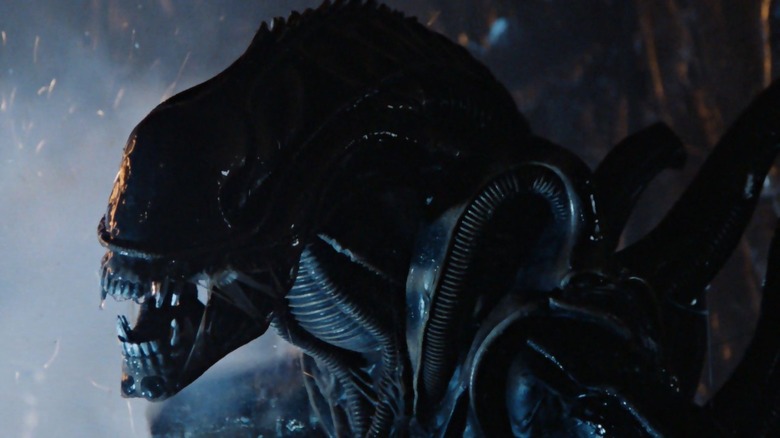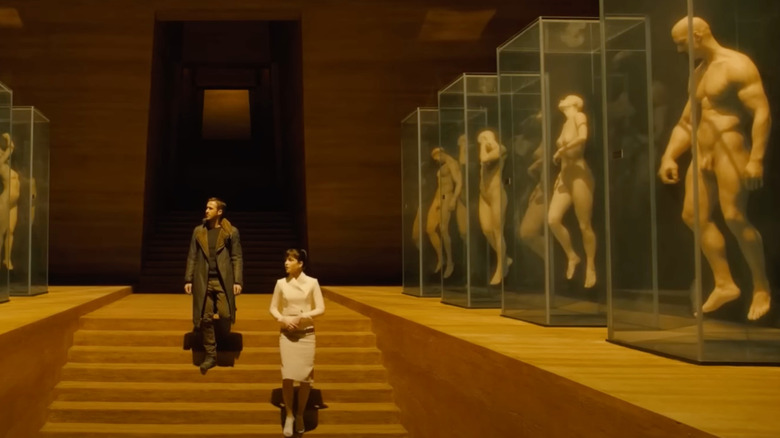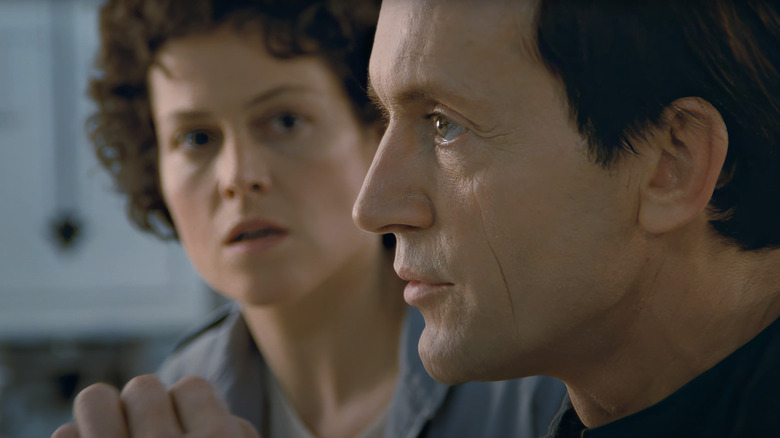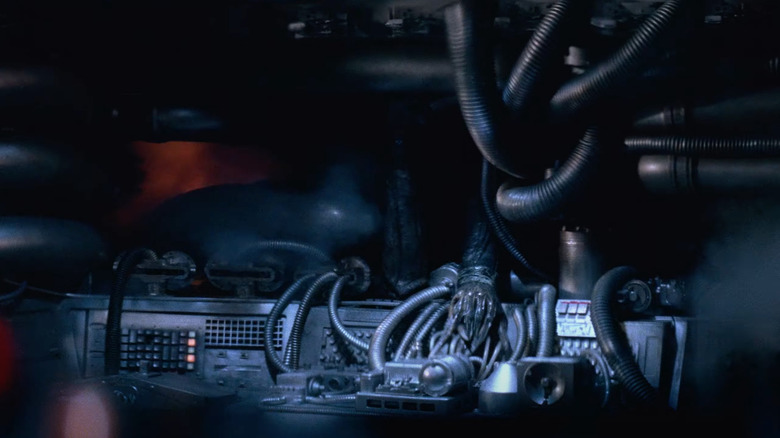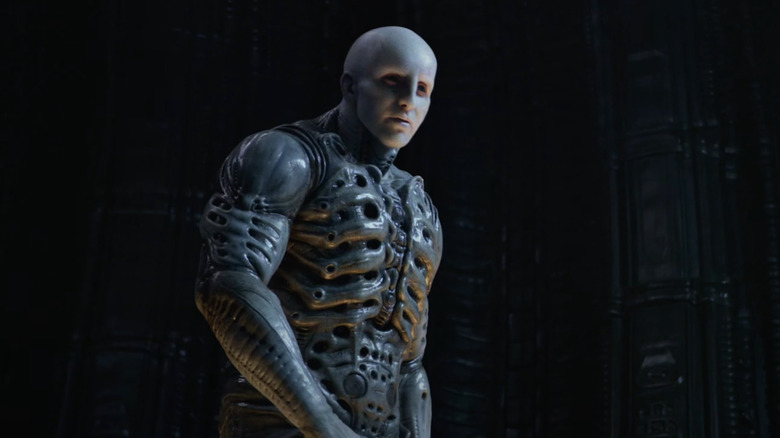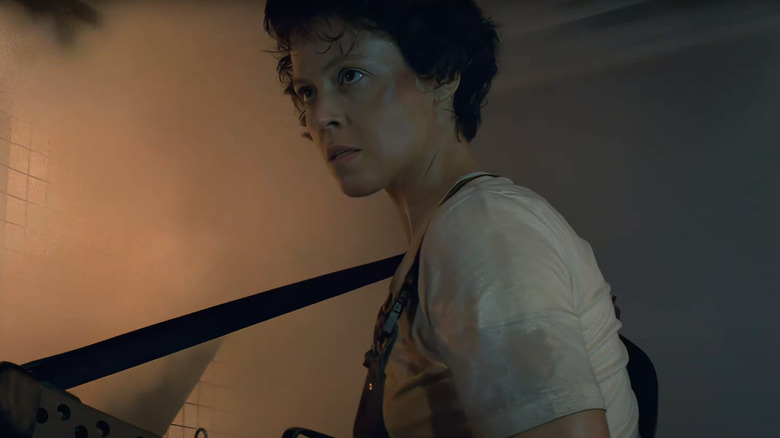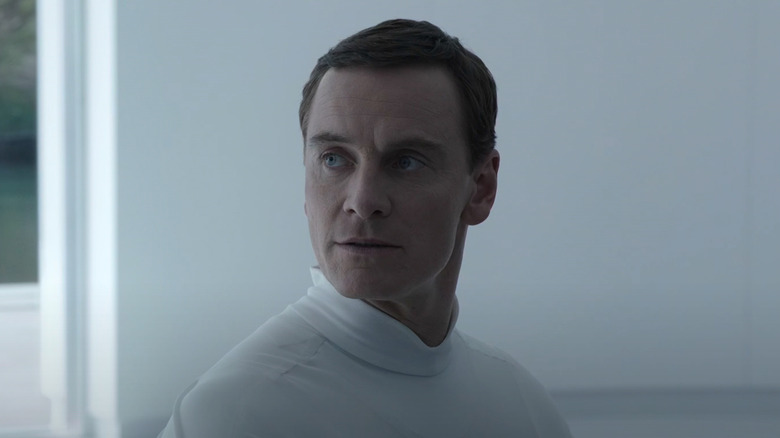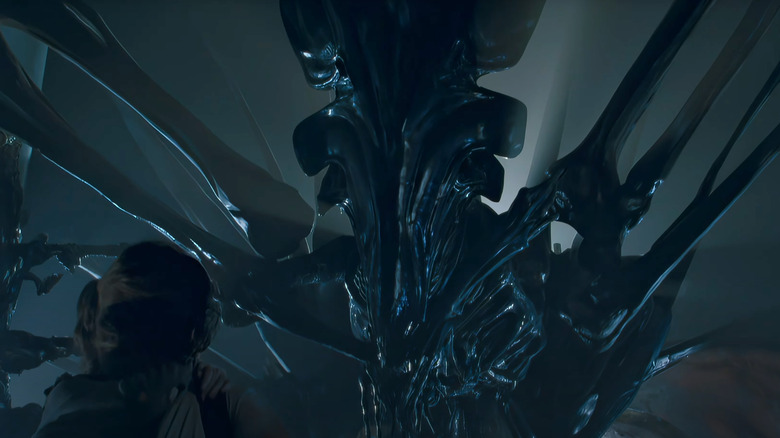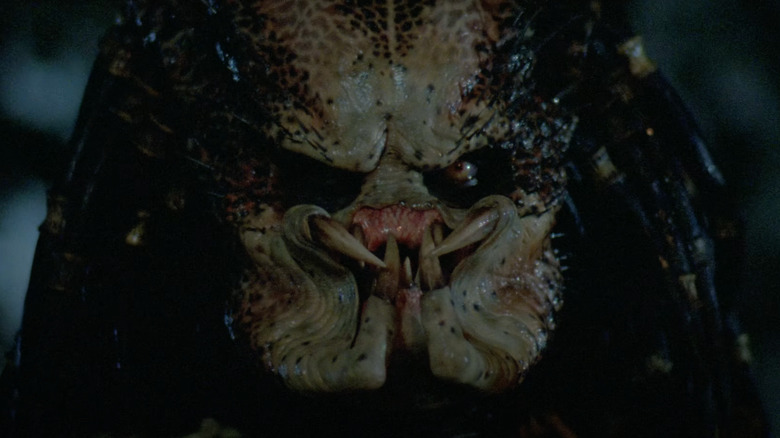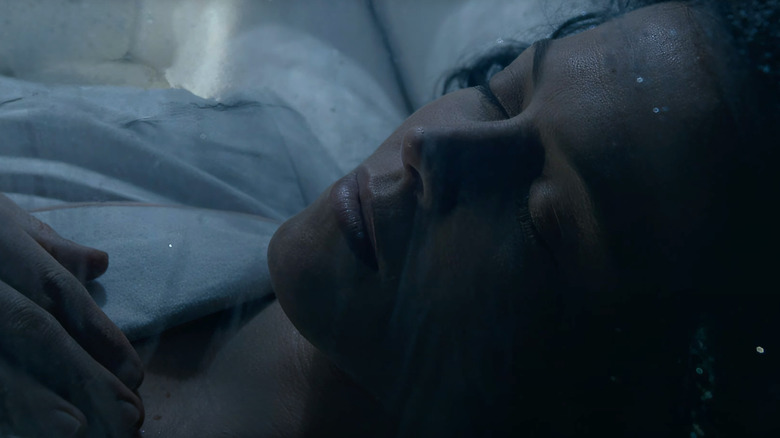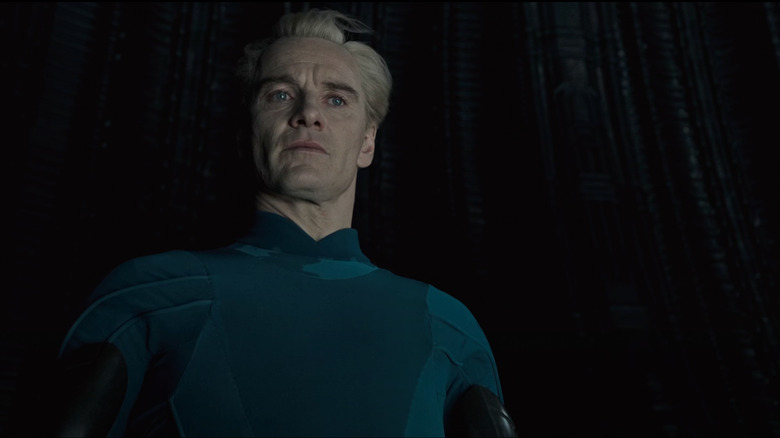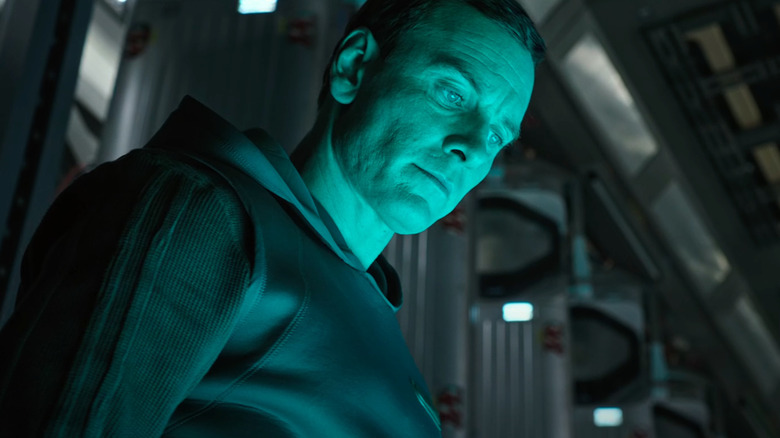Breaking Down The Best And Worst Alien Fan Theories
In 1979, Ridley Scott unleashed the science fiction classic "Alien" upon audiences and unwittingly kickstarted a lucrative franchise comprised of seven sequels and an assortment of books, comics, and video games. In August 2024, Fede Álvarez plans to release "Alien: Romulus," which will hopefully push the series in a creative new direction, delivering more Xenomorph horror action for audiences to enjoy.
The "Alien" franchise has amassed $1.6 billion at the global box office, despite more than a few bumps. Films such as David Fincher's "Alien 3" and Scott's own "Prometheus" and "Alien: Covenant" divided audiences with their strange methodology. In contrast, the "Alien vs Predator" films never amounted to more than cynical cash grabs. These sequels/prequels also retconned important lore or added new details to the Xenomorph that do not jibe with previously established material, leaving fans scrambling to make sense of the "Alien" timeline. Some of their theories are perfectly acceptable, while others raise even more questions or are too silly to take seriously.
That's why we've compiled a list of the best and worst "Alien" fan theories for your reading pleasure. In all likelihood, many of the plot holes or contrivances within the series exist as a result of shortcomings in the writing or filmmaking. Still, there's no harm in filling in logical gaps with our imagination. While you may find some of these theories amusing, others do in fact provide a solid foundation for the "Alien" universe. Get ready to dive into the intriguing world of "Alien" fan theories!
Best: Blade Runner and Alien share a universe
First, a long-running theory suggests that "Alien" and "Blade Runner" share the same universe, and it has a lot of evidence to support it. The YouTube page Alien Theory presents said evidence, noting that the futuristic timelines match, as does the existence of androids seeking self-awareness, a plot point explored heavily in Ridley Scott's "Alien" prequels "Prometheus" and "Alien: Covenant." Some of the tech, such as the computer layouts on the Nostromo, also match those seen on the ships driven by Harrison Ford's Deckard in "Blade Runner."
More pivotally, during the boardroom scene in James Cameron's "Aliens," Ripley stands in front of screens displaying her deceased shipmates, including Tom Skerritt's Dallas. Each photo features a small bio. Upon closer inspection, made possible by recent high-resolution film releases, viewers can see that Dallas once worked for the Tyrell Corporation, the high-tech firm responsible for producing replicants in "Blade Runner." If that weren't enough, in "Blade Runner 2049," a scene inside the Wallace Corporation features a human-like figure that resembles an Engineer from the "Prometheus" films. Granted, this could be a very muscular Replicant design, but it's more fun to think of the possibilities should the theory prove correct.
We're unlikely to see an "Alien"/"Blade Runner" mashup, but we can dream, right?
Worst: Bishop planted the egg
I'm not the biggest fan of David Fincher's "Alien 3." While I appreciate the decision to eschew the thrills of "Aliens" in favor of a darker, ponderous sequel more in line with Ridley Scott's "Alien," killing off Hicks (Michael Biehn), Newt (Carrie Henn), and Bishop (Lance Henriksen) remains one of cinema's more perplexing blunders. Moreover, our heroes are dispatched by a random face hugger born from an egg hidden on the ship. Many theories present logical reasons for how the egg ended on the Sulaco at the end of "Aliens," with some suggesting the Queen laid it just before her climactic battle with Ripley.
Still, some point to Bishop as the responsible party. According to AVP Central, the theory suggests Burke programmed Bishop with a secret order that bypassed the synthetic's "good" programming. This means that he committed the act without knowing what he was doing. Did he sneak back inside the Atmosphere Processor while Ripley (Sigourney Weaver) rescued Newt? Since Hicks was mostly passed out and Ripley was preoccupied, it may not have been too hard to grab an egg and bring it back to the ship.
Personally, I hate this theory, as it destroys Bishop's character arc. In "Aliens," Bishop slowly earns Ripley's trust, which is kind of a big deal after her encounter with Ash (Ian Holm) in the original "Alien." The pair formed a unique bond by the end, becoming unlikely friends following the film's dramatic events. Why throw that away?
Best: The Xenomorph in Alien was prepared to die
During the finale of "Alien," Ripley sets the Nostromo for self-destruction to destroy the Xenomorph and then races to an escape vessel. Once the ship explodes, she relaxes. To her horror, she discovers the alien aboard the small spaceship, leading to a tense final confrontation.
This otherwise brilliant sequence raises questions: why did the alien board the escape pod? Why didn't it attack Ripley sooner? How was Ripley able to defeat a monster that had previously proved nearly impossible to kill? Thankfully, I'm not the only person pondering such questions. A fan with the username boopbopnotarobot took to Reddit with a few theories. The alien either A) headed to the escape pod to die as it neared its life cycle's end, B) fled to the ship for some peace and quiet from the Nostromo's irritating alarms or C) returned to its crib, meaning the escape pod served as the creature's hiding place all along.
Director Ridley Scott noted in his commentary that the alien intended to head to the location to die, which explains the creature's sluggish movements and declining physical appearance. However, since the film doesn't explain any of this, we must arrive at our own conclusions. I like the idea that the alien picked out this location early on, meaning its death occurs more out of an unfortunate case of coincidence than survival instinct. Perhaps this extraterrestrial killer isn't as clever as everyone thinks it is.
Worst: Jesus Christ was an Engineer
For all its flaws, "Prometheus" delivers a sturdy amount of sci-fi horror that should satisfy fans of the "Alien" franchise, and some believe it's one of the boldest science fiction movies in recent memory. Focusing on the Engineers allows director Ridley Scott to tackle more profound questions about humanity while expanding the lore around the mysterious Xenomorphs. Still, the prequels tackle headier questions they are not fully prepared to answer. Moreover, Scott chickened out on some of the picture's more outrageous concepts, chief among them that Jesus Christ was an Engineer.
Yeah, you read that right. Scott confirmed this theory in a few interviews without stating with certainty that it was true, but it was also in the "Prometheus" script. Fans were left to put the pieces together using information presented in "Prometheus." Numerous Reddit fans engaged in heated debate over this concept, with a significant focus on the film's myriad allusions to Christianity, pinpointing specific dates, and dissecting Scott's fixation on the "ancient astronaut theory" popularized by Swiss author Erich von Däniken in the late '60s. This theory speculates that the Bible references time travelers, blurring the lines between modern science and divine miracles.
So, essentially, Engineers created humans, went back a few thousand years later to see how they were doing, and met a violent species that ultimately crucified one of them. Hence, they create the Xenomorph to wipe out humanity and start fresh.
It's certainly a bold concept, but as Scott told Movies.com (in a curiously hard-to-find interview), it was "a little too on the nose."
Best: Explanation for the lack of aliens in the nest
A terrific fan theory presents data to fill in the gaps on a particular plot contrivance in "Aliens." Late in the film, Ripley must return to the Atmosphere Processor to rescue Newt. Packing more heat than Rambo, Ripley bravely descends into the Alien Hive and surprisingly encounters very little resistance during her endeavor. She nails a few Xenomorphs with her Pulse Rifle but mostly slips through the strange structure unscathed until she bumps into the Alien Queen.
According to Reddit user MightyJagrafess, James Cameron explains the lack of Xenomorphs in the third act; he never says it outright, instead trusting the audience to put the pieces together. We are told there are 158 people on Hadley's Hope. The aliens only incubate around 50 percent of their victims and kill the rest, meaning there are roughly 70 aliens at the facility when the Colonial Marines arrive. During the alien hive action sequence, the Xenomorphs grab Apone (Al Matthews) and Dietrich (Cynthia Dale Scott) and kill the rest. Later, they snatch Hudson (Bill Paxton) and Burke (Paul Reiser), meaning the hive topped at around 75 aliens. The Marines kill a hefty amount during the ambush sequence, the sentry guns (in a deleted scene) kill even more, and then our heroes blast about 20 or so during the operations attack. So Ripley only had to deal with a dozen snarling baddies en route to pick up Newt, explaining how she escaped without much interference.
Worst: David is responsible for Alien
Hot take: "Prometheus" and "Alien: Covenant" are good films with big ideas that don't always gel. The notion that the Xenomorph owes its existence to an android's unchecked God complex is utterly captivating, offering profound implications for the entire franchise. That said, I hate the theory that David is directly responsible for the events seen in "Alien."
Reddit user starwarsunderpants proposed that David (Michael Fassbender) directed the Nostromo to the derelict ship on LV-426 after commandeering the USCSS Covenant at the end of "Alien: Covenant." He explains that David took control of the Weyland-Yutania Corporation after Peter Weyland's demise and sent them the coordinates to the ship on LV-426, instigating the events seen in "Alien."
This theory might check out, but it also sounds far too complex for a maniacal overlord like David. As another user points out in the comments, "Why wouldn't he just bring the embryos" attained during his mission on Origae-6 back to Earth? David wants to wipe out humanity, so why not just do it himself the way he destroyed the Engineers at the beginning of "Covenant" instead? Why go through all the trouble of directing a ship to a remote planet in the hopes that they will return it to Earth with the creature intact? There are far too many logical gaps for this one to make sense.
Best: Amanda Ripley kills a Queen in Alien: Isolation
Gamers don't appreciate "Alien: Isolation," a criminally underrated horror masterpiece that flawlessly captures the essence of Ridley Scott's original film with unparalleled detail. Players control Amanda Ripley as she investigates the space station Sevastopol for information about her mother, Ellen. Naturally, an alien outbreak occurs, and Amanda must stealthily find a way out of the terrifying scenario while uncovering darker secrets about the mysterious alien species.
Equally intense and horrifying, "Alien: Isolation" (which also has a digital series) expands the lore in exciting ways, and while it hews closely to Scott's film, it also borrows quite a bit from James Cameron's sequel, particularly in regards to the alien hive that appears near the end. Only one thing is missing: an Alien Queen. Something has to lay those eggs, right?
Some gamers believe the Queen exists on the ship, albeit in a completely different area of the vessel. They point to videos where you hear an alien screech that sounds more like a Queen than a typical Xenomorph. Listen to the sounds here, and judge for yourself. At any rate, it seems that by blowing up the reactor, Amanda inadvertently killed a Queen, sending the hive into disarray; hence, the reason so many aliens run amok in the final act.
Worst: Predators are mutated Engineers
I'm all about unique fan theories that add to a property's lore or present a fascinating spin on an old concept. However, fans do have a weird knack for overthinking their favorite properties. An excellent example of this is Jono-Tron's feeble attempt to explain why the Predators look like "ugly motherf******" in the "Predator" franchise. Spoiler: according to the Reddit user, they're genetically altered Engineers.
To be fair, Jono-Tron offers some interesting facts to back up his case. He explains the mysterious black goo created by the Engineers deforms everything it touches and could have produced the classic Predator look. These feared hunters "resemble an Engineer in that it is mostly pale, is humanoid, and is close in size when compared to humans." This explains, he notes, why the Predators carry dreadlocks and mandibles, which "are similar to the mandible-like mouth of the altered worm-like creature" in "Prometheus."
Surprisingly, many commenters below the initial post agree with or are willing to toy with this half-cocked theory. Another user points out that aliens exist in the "Predator" universe. Since we know the Engineers created humans and likely Xenomorphs, it makes sense that they could also be responsible for the iconic hunter-warriors.
It's fun to think about, but considering none of the films provide substantial evidence, this sounds more like wishful thinking than actual lore.
Best: Alien 3 and Resurrection are dreams
As I mentioned above, David Fincher's nightmare production of "Alien 3" is an enormous downgrade from the action-packed thrills of James Cameron's "Aliens" that effectively killed the franchise. "Alien Resurrection" attempted to reboot the series by reviving Ellen Ripley thousands of years in the future. Still, a dopey Joss Whedon screenplay (with a variety of endings) and over-stylized direction from Jean-Pierre Jeunet resulted in a bizarre abomination fans are more than happy to ignore.
Well, Reddit user Bright_Lie_9262 goes one step further and dismisses "Alien 3" and "Resurrection" as nightmares experienced by Ripley while in hypersleep following the events of "Aliens." I accept this hypothesis without evidence, but Bright_Lie_9262 makes some excellent points that cement their idea. For starters, "Aliens" establishes that Ripley suffers from PTSD, causing her to have terrible nightmares about the Xenomorphs. Secondly, the dream theory helps explain the random egg on the USS Solace — there was no egg. "The nightmare shows [Ripley] losing everything she fought to protect by her indirectly causing a new alien outbreak conveniently confined in a maximum security prison (trauma metaphor) without any weapons and a perfect environment for a xenomorph to thrive and feed."
Bright_Lie_9262 then discusses some of the finer points in "Alien 3," including the fact that all the prisoners speak English accents similar to Ash's in "Alien." Sold. As for "Resurrection," well, let's just say Ripley tends to dream weird s***.
Worst: David recreated the alien
For years, fans have tried to make sense of Ridley Scott's "Prometheus" and "Alien: Covenant" by crafting explanations for the black goo and Engineers to sort out the wacky plot holes found within the sequels. Some, including HeroSun on Reddit, believe that David did not create the iconic Xenomorphs but reverse-engineered them back into existence. "This is supported by the first Alien film," they explain, "where the crew of the Nostromo find a ship full of Xenomorph eggs that had been there for thousands of years, well before David made the Xenomorph seen in Covenant, and possibly before the events surrounding the Engineers depicted in Prometheus."
The user continues by pointing to two distinct alien beings created by David, the Neomorphs and Protomorphs, as science experiments before he arrives at the classic Xenomorph. Unfortunately, like the Engineers before him, David lost control of his subject, so he willingly helps Daniels and Tennessee kill the creature at the end of the "Covenant." In this instance, David destroyed the Engineers "to create a giant Petri dish full of possibilities."
This makes sense, except that Scott has confirmed in various interviews that David created the Xenomorph. While we can undoubtedly brush off his interpretation, the films make it clear that David's tinkering ultimately leads to the classic alien, designed to scourge humanity from existence.
Best: Walter is the true villain of Covenant
Finally, during the climax of "Alien: Covenant," two androids, Walter and David, get into a physical altercation that ends before we know who wins. A few moments later, Walter emerges from the Engineer temple. Cue the final confrontation with the Xenomorph aboard the Covenant, followed by Walter preparing Daniels for Hypersleep. Right before he puts Daniels to rest, he reveals that he is actually David. Of course, this makes little sense, considering the brief time he had to rework his appearance to look like David before joining the others on the lander.
Well, a fan called RISINGCHART believes that Walter is the synthetic we see at the end of the film. He believes that Walter hid in plain sight as the film's true villain, learned David's ways, and decided to betray his crew and execute David's plan. I like this idea, as it fills in a few plot holes, but why would Walter not know the answer to Daniels' question about her cabin? It likely happened that a scene with Daniels and Lopé evading a Praetomorph and Neomorph inside the Engineer temple was cut, making their journey to the lander appear much faster. If the scene remained, David would have had enough time to kill Walter and get into his garb. As for his wounds, let's just say Ridley Scott isn't always prone to details.
